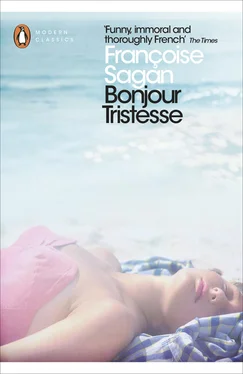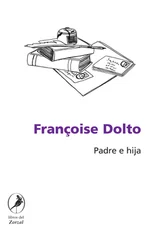‘Much of the time life is a sort of rhythmic progression of three characters,’ Sagan said in an interview, shortly before the publication of A Certain Smile . In Bonjour Tristesse , this structural tenet is illustrated almost sculpturally by Cécile’s description of the three adults standing on the stairs the night Raymond transfers his affections from Elsa to Anne: ‘I recall the scene exactly. Immediately in front of me I was looking at Anne’s golden neck and perfect shoulders. A little lower down stood my father with a dazzled expression on his face and with his hand outstretched. And already fading into the distance was the silhouette of Elsa.’ These two novels, so spare and rigorous, so artistically correct, so thorough in their psychological realism, are the highest expression of the triangular purity of their author’s strange and beautiful esthétique.
Rachel Cusk, 2008

Farewell to sadness
Sadness hello
You are written in the lines on the ceiling
You are written in the eyes that I love
You are not the same as wretchedness
For the poorest lips reproach you
With a smile
Sadness hello
Lovers’ bodies love you
You are the force in love
And what’s lovely in you looms
Like some disembodied thing
Just a look that’s disappointed
Sadness you are fair of face
Paul Éluard, La Vie immédiate 1
PART ONE
One
This strange new feeling of mine, obsessing me by its sweet languor, is such that I am reluctant to dignify it with the fine, solemn name of ‘sadness’. It is a feeling so self-indulgent and complete in itself that I am almost ashamed of it, whereas I had always looked upon sadness as being a worthy emotion. Before, I did not know what sadness was, though I knew what it was to be languorous, to have regrets and, more rarely, to feel remorse. Today it is as if I am enfolded in some silken thing, soft and enervating, that sets me apart from others.
In the summer in question I was seventeen and perfectly happy. The ‘others’ were my father and Elsa, his mistress. I should explain the situation right away, as it could give the wrong impression. My father was forty and had been a widower for fifteen years. He was a youthful man, full of life and possibilities, and two years previously, when I had left boarding school, I could not have failed to realize that he was living with a woman, though it took me longer to accept that it would be a different one every six months! But soon his charm, my easy-going new life and my own disposition brought me round to the idea. He was a light-hearted individual, a good businessman, someone who was always curious but who quickly tired of things, and he was attractive to women. I found him an easy person to love, and I loved him dearly, for he was kind, generous, lively and full of affection for me. I cannot imagine a better or more amusing friend. At the start of the summer he was even good enough to ask me whether it would be a nuisance to me during the holidays to have the company of Elsa, his current mistress. I could not but give him an encouraging reply because I knew his need for women and I also knew that having Elsa would not be a problem for us. She was a tall, red-headed girl, a mixture of playmate and sophisticate, who hung out in the cinemas and bars of the Champs-Élysées. She was very sweet, rather dim and quite unpretentious. Besides, my father and I were so pleased just to be going away that we had no objection to anything. He had rented a large white villa on the Mediterranean, a gorgeous, secluded house that we had been dreaming of since the beginning of the warm weather in June. It stood on a promontory overlooking the sea and was hidden from the road by a pine wood. A goat-track led down to a little sun-drenched inlet edged with rust-coloured rocks where the sea swayed back and forth.
The first few days were glorious. We spent hours on the beach, overwhelmed by the heat and gradually acquiring a healthy golden tan, except for Elsa, who was having a terrible time, going red and peeling. My father worked through various complicated leg exercises with the aim of getting rid of a small paunch that did not suit his image as a lady-killer. I was in the water from dawn. It was cool, clear water and I would get thoroughly immersed in it and tire myself out with uncoordinated exertions in an attempt to wash away all the murk and dust of Paris. I would stretch out on the sand, take up a handful and then let it trickle through my fingers in a gentle yellow stream. I told myself that it was trickling away like time, and that it was facile to think like that and that it was pleasant having facile thoughts. It was summertime.
On the sixth day I saw Cyril for the first time. He was hugging the coast in a little sailing boat and he capsized at the mouth of our inlet. I helped him rescue his belongings and, as we laughed together, I learnt that he was called Cyril, that he was a law student and that he was spending his holidays with his mother in a neighbouring villa. He had a typically Latin face, very brown, very open, and he had a sensible, reliable look about him that I immediately liked. Yet I normally avoided university students, whom I considered to be coarse and preoccupied with themselves and, above all, preoccupied with their own youth: to them just being young was a drama in itself, or an excuse for being bored. I did not like young people. I much preferred my father’s friends, men of forty, who spoke to me with courtesy and affection, and treated me with the gentleness of a father or lover. But I liked Cyril. He was tall and could sometimes appear handsome, with a type of handsomeness that inspired confidence. I did not share my father’s aversion to ugliness, which often led us to associate with stupid people. Even so, whenever I was faced with people who were without any physical charm, I experienced a sort of uneasiness, a sense of remoteness; the fact that they were resigned to being unattractive struck me as being an unseemly failing on their part. For, after all, what was our aim in life, if not to be attractive to others? I still do not know today whether this desire to captivate stems from a surfeit of energy, or whether what lies behind it is a desire to control, or a covert, unacknowledged need to feel reassured and confirmed in oneself.
On departing, Cyril offered to teach me to sail. I went back in for dinner quite absorbed in thinking about him, and I took little or no part in the conversation; indeed I barely noticed that my father was agitated. After dinner we stretched out on reclining chairs on the terrace, as we did every evening. The sky was studded with stars. I gazed up at them, vaguely hoping that they would be in advance of the season and would begin to fall, streaking through the sky. But it was only the beginning of July, too early for shooting stars. In the gravel of the terrace the cicadas were singing. There must have been thousands of them, drunk with the heat and the moonlight, uttering that strange cry of theirs all night long. I had had it explained to me that all they were doing was rubbing one outer wing against the other, but I preferred to believe in a song coming from their throats, as guttural and instinctive as the call of cats in the mating season. We were completely at ease; all that prevented me from succumbing to the gentle onslaught of sleep were the tiny grains of sand between my skin and my blouse. It was at that point that my father gave a little cough and sat up on his recliner.
‘I’ve news for you,’ he said. ‘Someone is coming to stay.’
Читать дальше













